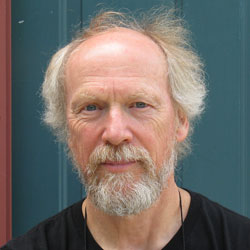***
The neighbour’s lawn mower roars and recedes.
My mother sleeps on the loveseat, my father
on the couch. I shake out mats in the blinding
porch, gather grey tea towels for the laundry.
My father bustles stiffly out to plug in
the kettle, comes up from the cellar with chunks
of maple, measuring, figuring – how to make
wooden nuts and bolts – then is suddenly
sunk in an armchair, open-mouthed asleep,
while June sunlight storms through the house.
***
I ask about the empty mirror frame on the kitchen
wall. My father glances at me and away, looking
reluctant, caught. Then speaks with odd formality,
doggedly, against some current of shyness or disbelief
or sorrow or fear. He says while they were having
lunch there at the table a few weeks ago they heard
a loud bang like a gunshot close by. He looked around
and found the mirror down on the floor, its heavy glass
split up the middle. “You try to get that off of there,”
he points to the empty frame. A slotted hole in its back
locks the frame tight to a round-headed screw set deep
in a wall stud. I lift and slowly work it free, then press it
back into place, centred, anchored. Enclosed blank
wall. “There’s no way that could have come off
by itself,” he says, bare-headed under low dark cloud.
***
Curled on the loveseat under a blanket
much of each day, sleeping or merely
still, her open eyes travelling the room.
She never grieves for herself, never
stands apart disowning or lamenting
the ruin, but sometimes terrors sweep
through her, weightless spinning and inner
sleets, and she sits shaking, calling out that
she’s falling, and my father or I hold her
trying to save her from deep space.
Notes on the Poem
"Once" is a sequence of poetic snapshots dropped softly in the center of John Steffler's collection "Lookout." Steffler's poignant observations about a family coping with their parents' decline are shot through with flashes of life, grace and dignity. Certain objects and images are referenced with almost talisman-like reverence. What are those talismans possibly meant to achieve, for either the narrator or the reader? Central to the excerpts from the "Once" sequence shown here is the striking image of an empty mirror frame. That the mirror has broken and now the parents can't glimpse themselves in it is haunting. That the mirror broke in a sudden and almost cataclysmic fashion, with "a loud bang like a gunshot close by", is shocking and troubling. That the frame remained up, stubbornly, is both bemusing and a bit unsettling. "Enclosed blank wall" bluntly and richly sums it up. What does it all portend? A "frame" around this image are references to the narrator's mother burrowed in a loveseat. That she sleeps or is "merely still" in the loveseat suggests it is a retreat for her in a house that has grown bewildering and threatening around her. That it is the place where her husband and her child comfort her is deeply moving. "Once" establishes the same intimacy and balance of stoicism, wistfulness and preemptive grief of Anne Carson's "Father's Old Blue Cardigan", from "Men in the Off Hours". (Elsewhere in the "Once" sequence, the narrator's mother also appears in "her drooping cardigan.") Ultimately, are the loveseats and cardigans that offered embracing sanctuary and protection to the loved ones soon to be departed ... really talismans to those who will be left behind?
